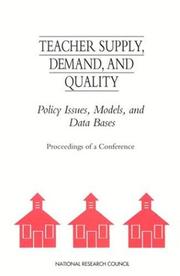| Listing 1 - 10 of 714 | << page >> |
Sort by
|
Book
Year: 1974 Publisher: Paris : D. Reidel,
Abstract | Keywords | Export | Availability | Bookmark
 Loading...
Loading...Choose an application
- Reference Manager
- EndNote
- RefWorks (Direct export to RefWorks)
Oceanographic intelligence --- Education --- Universities --- Instructors --- Laboratories --- Information centers --- Oceanographic intelligence --- Education --- Universities --- Instructors --- Laboratories --- Information centers
Book
ISBN: 9264270698 926427068X Year: 2017 Publisher: Paris : OECD,
Abstract | Keywords | Export | Availability | Bookmark
 Loading...
Loading...Choose an application
- Reference Manager
- EndNote
- RefWorks (Direct export to RefWorks)
Teachers. --- Faculty (Education) --- Instructors --- School teachers --- Schoolteachers --- School employees

ISBN: 8301083034 Year: 1988 Volume: vol 967 vol LXI
Abstract | Keywords | Export | Availability | Bookmark
 Loading...
Loading...Choose an application
- Reference Manager
- EndNote
- RefWorks (Direct export to RefWorks)
Teachers --- Faculty (Education) --- Instructors --- School teachers --- Schoolteachers --- Education --- School employees --- Educators --- Training of --- -Attitudes. --- Attitudes --- Attitudes.
Book
ISBN: 0080164846 Year: 1971 Publisher: Oxford Pergamon
Abstract | Keywords | Export | Availability | Bookmark
 Loading...
Loading...Choose an application
- Reference Manager
- EndNote
- RefWorks (Direct export to RefWorks)
Teachers --- In-service training --- Faculty (Education) --- Instructors --- School teachers --- Schoolteachers --- Education --- School employees --- Educators --- -Teachers
Book
ISBN: 1850000883 Year: 1986 Publisher: Philadelphia London : The Falmer Press,
Abstract | Keywords | Export | Availability | Bookmark
 Loading...
Loading...Choose an application
- Reference Manager
- EndNote
- RefWorks (Direct export to RefWorks)
School supervision --- Teachers --- Faculty (Education) --- Instructors --- School teachers --- Schoolteachers --- School employees --- Dismissal of --- Rating of

ISBN: 0309047927 9786610196326 1280196327 0309584965 0585085536 9780585085531 9781280196324 661019632X 9780309584968 9780309047920 Year: 1992 Publisher: Washington, D.C. : National Academy Press,
Abstract | Keywords | Export | Availability | Bookmark
 Loading...
Loading...Choose an application
- Reference Manager
- EndNote
- RefWorks (Direct export to RefWorks)
Teachers --- Supply and demand --- Rating of --- Faculty (Education) --- Instructors --- School teachers --- Schoolteachers --- School employees
Book
ISBN: 0691051941 1322884706 0691619409 0691646309 1400868351 9781400868353 9780691619408 9780691051949 Year: 2015 Publisher: Princeton, NJ
Abstract | Keywords | Export | Availability | Bookmark
 Loading...
Loading...Choose an application
- Reference Manager
- EndNote
- RefWorks (Direct export to RefWorks)
The postwar political and technological-industrial revolutions have brought profound changes to Poland. Yet although a generation has now grown up in the Communist ideology, the transformation it demands is far from complete. Traditional institutions, values, and patterns of behavior continue to exist and are in daily confrontation with the new regime.Education must obviously play a critical role in the process of socialization, and teachers are expected to instill in future citizens a thorough commitment to socialist values. But how well are they equipped for this task? To answer this question Joseph R. Fiszman has done extensive field work in Poland sponsored by the U.S. Office of Education. He is the first American citizen permitted to do research of this type in an Eastern European country. He has examined all aspects of the teachers' lives, from social background and training to attitudes, values, and status in the community. His findings are an important contribution to the attempt to understand the process of change in societies where revolutionary values face the entrenched power of tradition.Originally published in 1973.The Princeton Legacy Library uses the latest print-on-demand technology to again make available previously out-of-print books from the distinguished backlist of Princeton University Press. These editions preserve the original texts of these important books while presenting them in durable paperback and hardcover editions. The goal of the Princeton Legacy Library is to vastly increase access to the rich scholarly heritage found in the thousands of books published by Princeton University Press since its founding in 1905.
Teachers --- Social conditions. --- Faculty (Education) --- Instructors --- School teachers --- Schoolteachers --- Education --- School employees --- Educators
Book
ISBN: 0205116752 Year: 1989 Publisher: Boston Allyn and Bacon
Abstract | Keywords | Export | Availability | Bookmark
 Loading...
Loading...Choose an application
- Reference Manager
- EndNote
- RefWorks (Direct export to RefWorks)
Teachers --- Faculty (Education) --- Instructors --- School teachers --- Schoolteachers --- Education --- School employees --- Educators --- In-service training --- -Teachers
Book
Abstract | Keywords | Export | Availability | Bookmark
 Loading...
Loading...Choose an application
- Reference Manager
- EndNote
- RefWorks (Direct export to RefWorks)
Teachers --- Faculty (Education) --- Instructors --- School teachers --- Schoolteachers --- Education --- School employees --- Educators --- Training of --- -Teachers
Book
ISBN: 9514573064 Year: 1996 Publisher: Helsinki University of Helsinki
Abstract | Keywords | Export | Availability | Bookmark
 Loading...
Loading...Choose an application
- Reference Manager
- EndNote
- RefWorks (Direct export to RefWorks)
Teachers --- #eLINK --- Faculty (Education) --- Instructors --- School teachers --- Schoolteachers --- Education --- School employees --- Educators --- Training of --- -Teachers
| Listing 1 - 10 of 714 | << page >> |
Sort by
|

 Search
Search Feedback
Feedback About UniCat
About UniCat  Help
Help News
News